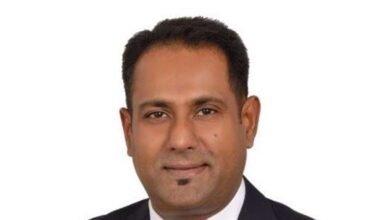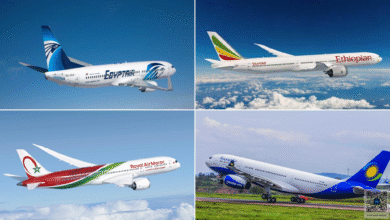Clare Akamanzi : « Sports can transform African economies »
In this interview, Clare Akamanzi, CEO of NBA Africa, shares her vision of the role of sports, particularly basketball, in the economic and social development of Africa.

What role do sports, particularly basketball, play in the economic and social development of Africa?
Sports are transformative, both in the life of an individual who participates in sports and in the economy of countries, including those in Africa. Traditionally, sports have been seen as a recreational activity or for physical education in many countries across the continent.
But more recently, African economies have placed emphasis on using sports as an economic pillar. Countries like Rwanda, South Africa, Egypt, Morocco, and Tunisia show how this can work. How is it possible? When a country organizes sporting events, it generates significant economic benefits. Visitors pay for their flights, use transport, stay in hotels, dine at restaurants, and support sectors like agriculture, digital health, or innovation.
Sports also stimulate other industries, such as security or digital marketing, which are crucial for organizing events. It generates opportunities for both small and large businesses, from local suppliers to major airlines. In mature sports economies, sports significantly contributes to economic growth. Today, the global sports industry is worth about $500 billion. Africa can capitalize on this opportunity, and countries like Rwanda are showing this with events like FIA Motorsports, the World Cycling Championships, and basketball.
How does NBA Africa contribute to creating opportunities for young African talents, both on and off the court?

The NBA is the top basketball league in the world, known for its exceptional talent and cultural influence. After its success in North America, the NBA decided to expand internationally, and Africa became the second market where it launched a league: the Basketball Africa League (BAL). Since its creation four years ago, the BAL, a collaboration between the NBA and FIBA, has seen impressive growth. During the first season, held amid the COVID-19 pandemic, there was no audience. The following year, 45,000 people attended games in the arenas across three host cities, then 70,000 the next year, and more than 120,000 in the fourth year across four host cities. This rapid growth reflects the increasing interest in basketball in Africa.
The NBA also offers a platform for local federations, which invest more in their teams. New teams, like the Nairobi City Thunder in Kenya or the Cape Town Tigers in South Africa, have emerged to participate in the BAL. This has also encouraged local sponsors to support basketball, such as the RSS Group in Rwanda or other businesses funding local leagues.
Meanwhile, the NBA is investing in the ecosystem by building infrastructure and developing talent. NBA Deputy Commissioner Mark Tatum has recently announced our plan to build 1,000 basketball courts in Africa over the next ten years. Courts have already been built in Mozambique, Angola, Kenya, and Rwanda. We also run elite training camps, like the Basketball Without Borders (BWB) program, which has uncovered talents such as Camerooon’s Joel Embiid, the 2023 Kia NBA Most Valuable Player (Philadelphia 76ers), and Pascal Siakam (Indiana Pacers).
The NBA also runs programs for younger players, such as Jr. NBA clinics, where youth are introduced to basketball at school. These initiatives aim to develop and nurture talent while providing young people and their communities opportunities to excel.
What are the main challenges you’ve faced in developing the NBA brand in Africa, and how have you overcome them?
One of the biggest challenges in Africa is the lack of infrastructure. Unlike in the United States, where there is a basketball court in almost every school, many African countries lack the necessary facilities. This is why the NBA is heavily investing in building courts to give young people and their communities access to basketball.
Another challenge is the underdevelopment of the sports ecosystem. For instance, it was difficult at first to mobilize local sponsors or attract talent. But with the results we’ve achieved, particularly with the BAL, more and more private partners are getting involved in African basketball. Finally, the training and development of talent has been a major challenge, which we are addressing through the camps and clinics set up on the continent to upskill local coaches, referees and youth through our Jr. NBA programming.
Can basketball become an economic driver for Africa, similar to football? If so, how?

Absolutely. Basketball has tremendous potential to transform African economies. We have already seen how countries like Rwanda are using sporting events to attract investments, promote tourism, and boost various economic sectors. Thanks to the BAL, basketball offers unique opportunities for regional integration and showcasing African talent.
Moreover, organizing regular competitions stimulates the local economy, whether through transport, accommodation, dining, or associated services like security and marketing. In the long term, developing an ecosystem around basketball can create jobs, encourage entrepreneurship, and strengthen local industries.
What projects or collaborations does NBA Africa have in the pipeline to strengthen the sports and entrepreneurial ecosystem on the continent?

@NBA Africa Academy
NBA Africa has several ambitious projects for the coming years. In addition to building 1,000 courts, we plan to expand our partnerships with local and international companies to fund development programs. The goal is also to make basketball accessible to the largest number of people through initiatives like Jr. NBA clinics and, leagues. We are also collaborating with schools to integrate basketball into educational programs while raising awareness among young people about the opportunities basketball has to offer, both on and off the court , such as in related fields like sports management and marketing. NBA Africa’s 2025 agenda clearly focuses on sustainability, inclusion, and the long-term development of basketball in Africa.







